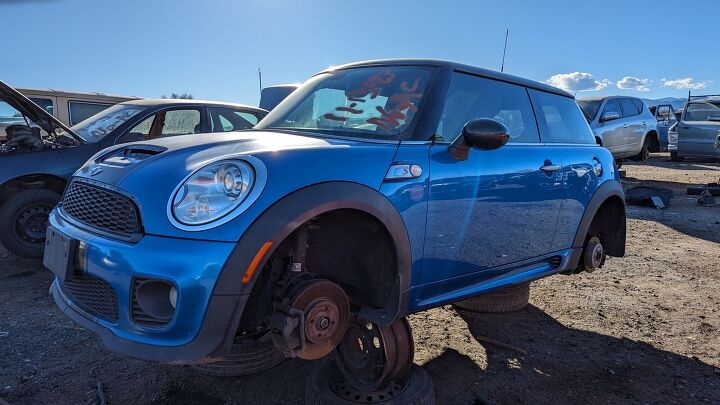The “New Mini” first appeared in North American showrooms as a 2002 model, as part of the turn-of-the-century wave of retro-styled machinery that included the Volkswagen New Beetle, Chrysler PT Cruiser and Chevrolet HHR. It took about a decade for the 21st-century Mini to begin showing up in car graveyards in large numbers, and they remain easy to find today. Here’s an ’07 Cooper S model in a Colorado yard.

When BMW bought the Rover Group in 1994, the original Mini (which began production by the British Motor Corporation in 1959) was still being built. The various BMC successors had tried and failed repeatedly to design a Mini successor over the decades, but it took a big stack of Deutschmarks (and, later on, Euros) to do the trick.

I know that the official name of this car’s marque is spelled MINI in annoying all-caps letters, but I have adopted a policy of repairing make and model names that incorporate such maddening tricks as punctuation marks or all-uppercase/all-lowercase letters. That means I refuse to play the marketers’ clever games with the Nissan LEAF, smart fortwo, Volkswagen up! and all the rest (FIAT is a tough one, since it started out as a legitimate acronym for Fabbrica Italiana Automobil di Torino, but the company itself ditched the all-caps spelling many years ago).

The MSRP for the regular 2007 Mini Cooper was $18,050, while the hot-rod Cooper S version listed at $21,850 (those prices come to $27,673 and $33,498 in 2024 dollars).

New for 2007 was this 1.6-liter turbocharged straight-four engine co-developed by Peugeot and BMW, replacing the supercharged Brazilian 1.6 and its Chrysler/Rover ancestry.

This engine was rated at 175 horsepower and 177 pound-feet.

A six-speed manual was standard equipment. A six-speed Steptronic automatic was available; unusually, the buyer of this car chose the three-pedal setup.

There were convertible versions of the Cooper and Cooper S available as well.

Mini dealers offered many add-on accessories, including these John Cooper Works sill plates. They didn’t make this car a real JCW, but still looked cool.

Way back in 2009, a 24 Hours of Lemons team tried to get a 2005 Cooper S through the BS Inspection unscathed, earning 1,066 penalty laps in the process.

By about the middle 2010s, these cars began appearing en masse in the boneyards I frequent, so many that I thought about doing a Minipocalypse article on the subject (along the lines of the Subiepocalypse and 240calypse pieces I wrote for this publication).

Now, of course, Mini Coopers are seen competing in most 24 Hours of Lemons races. They’re cheap, quick enough to be fun, and junkyard parts are plentiful. Their main drawback is poor reliability, a trait they share with Lemons cars made by Toyota, Audi, Subaru, Mitsubishi and Nissan (strangely, cheap Alfa Romeos are very reliable under punitive road-racing conditions).

You could do a lot worse than a Mini Cooper S as a cheap project car, thanks to their fell-off-a-cliff depreciation and vast parts availability.

There is a lot of room in here, huh?

From the “What could they have been thinking?” department.

2007 Mini Cooper S in Colorado junkyard.

2007 Mini Cooper S in Colorado junkyard.

2007 Mini Cooper S in Colorado junkyard.

2007 Mini Cooper S in Colorado junkyard.

2007 Mini Cooper S in Colorado junkyard.

2007 Mini Cooper S in Colorado junkyard.

2007 Mini Cooper S in Colorado junkyard.

2007 Mini Cooper S in Colorado junkyard.

2007 Mini Cooper S in Colorado junkyard.

2007 Mini Cooper S in Colorado junkyard.

2007 Mini Cooper S in Colorado junkyard.

2007 Mini Cooper S in Colorado junkyard.

2007 Mini Cooper S in Colorado junkyard.

2007 Mini Cooper S in Colorado junkyard.

2007 Mini Cooper S in Colorado junkyard.

2007 Mini Cooper S in Colorado junkyard.

2007 Mini Cooper S in Colorado junkyard.

2007 Mini Cooper S in Colorado junkyard.

2007 Mini Cooper S in Colorado junkyard.
[Images: The Author]
Become a TTAC insider. Get the latest news, features, TTAC takes, and everything else that gets to the truth about cars first by subscribing to our newsletter.

